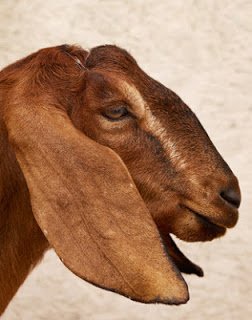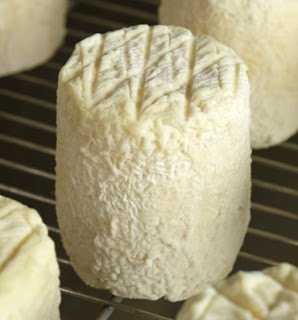 |
Hill Farm Dairy makes Stawley
with milk from its own herd |
Goat’s cheese doesn’t
always get the respect it deserves in this country. That’s partly
due to Britain’s climate and landscape being suited to grazing cows
and making big cheeses, such as Cheddar and Lancashire. It’s also
because many people have only ever tried those mass-produced logs of
goat’s cheese that either taste of nothing or have such a “goaty”
tang they put people off for life.
But it doesn’t have
to be this way. Britain now makes some acclaimed goats’ cheeses
that have earned the right to strut their stuff on any cheeseboard.
British goat's cheeses,
such as Tymsboro, Cardo and Stawley, are among the very best cheeses
he has to offer.
Cardo and Tymsboro are
produced by veteran cheesemaker Mary Holbrook using milk from her own
herd at Sleight Farm near Bath, while Stawley is made in the village
of the same name by newcomers Will and Caroline Atkinson.
Like many other young
British cheesemakers, the Atkinsons trained at Sleight Farm before
setting up their own business in 2009. Will Atkinson, who makes
Stawley with his wife Caroline using raw milk from their own goats,
is effusive about Holbrook's impact. “She's the godmother of
British goat's cheese,” he says. “There was a dearth of artisan
goat's milk cheese producers before Mary. She did it off her own back
over 30 years ago.”
Holbrook modestly
brushes the tribute away when I speak to her. “It's curious to be
called a godmother!” she laughs. “I don't feel like that. I've
just been doing it for a long while, but it's nice that my cheeses
are well thought of.”
Shaped like a pyramid
with the top cut off and a pretty charcoal-dusted rind, Tymsboro was
one of Holbrook's first cheeses and is similar to a classic French
Valençay. It's made with raw milk and is creamy with a silky smooth
texture when young, but can be aged for up to two months becoming
denser and more concentrated in flavour as it matures.
 |
| Stawley: gentle, sweet & lemony |
Intensity is also a
characteristic of Cardo - a much larger washed rind goat's cheese
that is based on the mountain 'queijos' of Portugal. Holbrook uses
the dried petals and stamen of a thistle-like plant called cardoon to
curdle the milk, rather than traditional rennet, before cutting the
curd by dragging her bare arms through the vat.
The unusual production
process leads to a cheese with a unique texture, ranging from
meltingly soft to quite firm, while the flavour takes in chicory
notes from the cardoon with a big meaty hit from the sticky orange
rind.
It's a very different
cheese to the gentle Stawley, which is sweet and milky with a pretty
wrinkled rind. “Our cheese doesn't have any of those strong goaty
flavours that often put people off,” says Atkinson. “We've
managed to persuade some who say they don't like goat's cheese to
change their minds after tasting Stawley.”
A longer version of this article appeared in the May issue of Harrods Magazine. To read it click here


